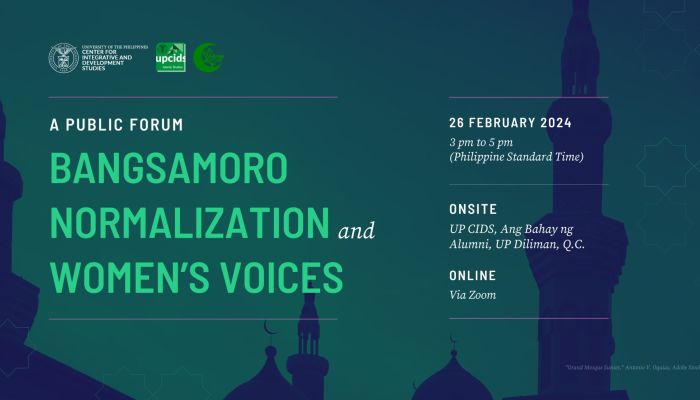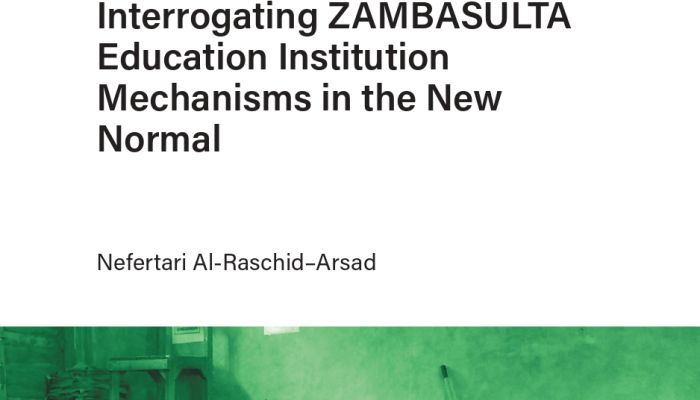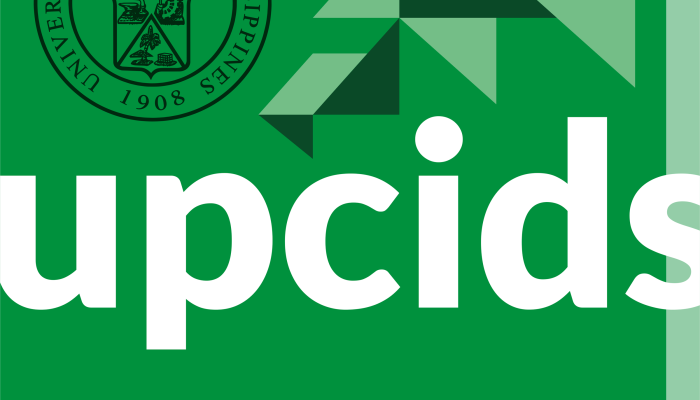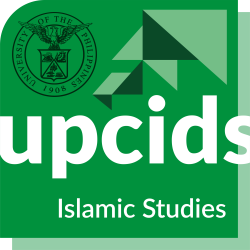
Islamic Studies Program (ISP)
-
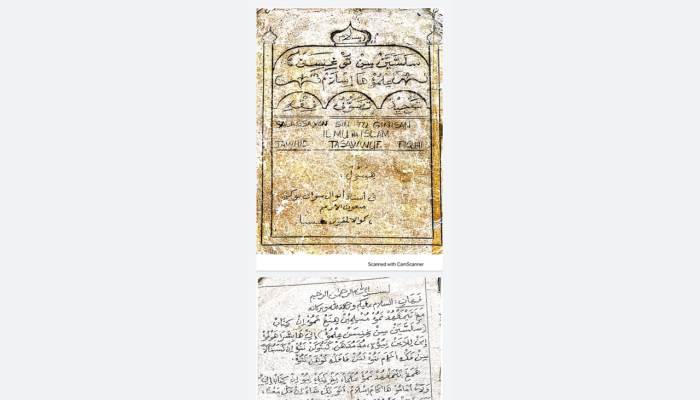 Source/Credit: Mujahid Imao taken through Benzar LadjaTop: A resource material on the classifications of knowledge in Islam. Bottom: A sample Jawi material found in General Santos City.
Source/Credit: Mujahid Imao taken through Benzar LadjaTop: A resource material on the classifications of knowledge in Islam. Bottom: A sample Jawi material found in General Santos City. -
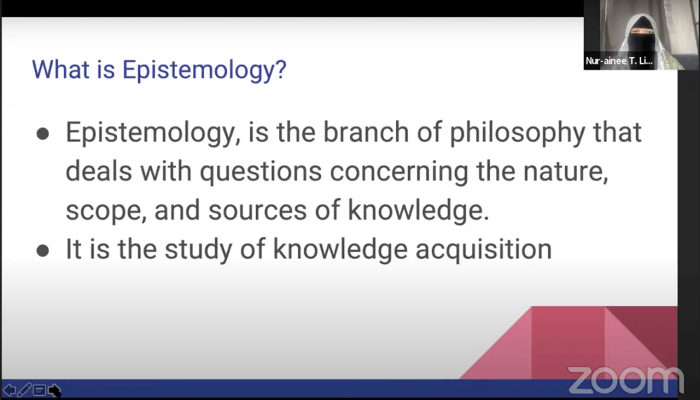 Source/Credit: Islamic Studies ProgramMs. Nur-ainee Tan-Lim defines the key terms in her lecture on Islamic Epistemology.
Source/Credit: Islamic Studies ProgramMs. Nur-ainee Tan-Lim defines the key terms in her lecture on Islamic Epistemology. -
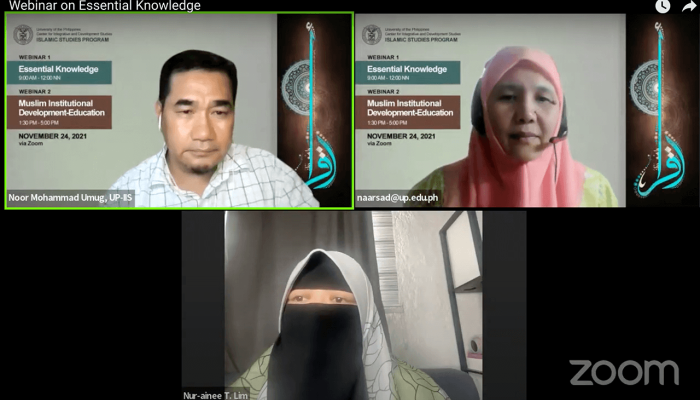 Source/Credit: Islamic Studies ProgramDr. Nefertari A. Arsad invites the attendees for a photo session as the webinar concludes.
Source/Credit: Islamic Studies ProgramDr. Nefertari A. Arsad invites the attendees for a photo session as the webinar concludes. -
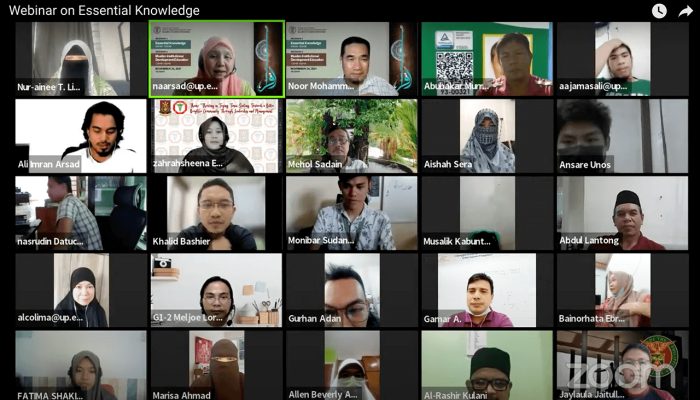 Source/Credit: Islamic Studies ProgramMr. Noor M. Umug moderates the open forum of the webinar on Essential Knowledge.
Source/Credit: Islamic Studies ProgramMr. Noor M. Umug moderates the open forum of the webinar on Essential Knowledge. -
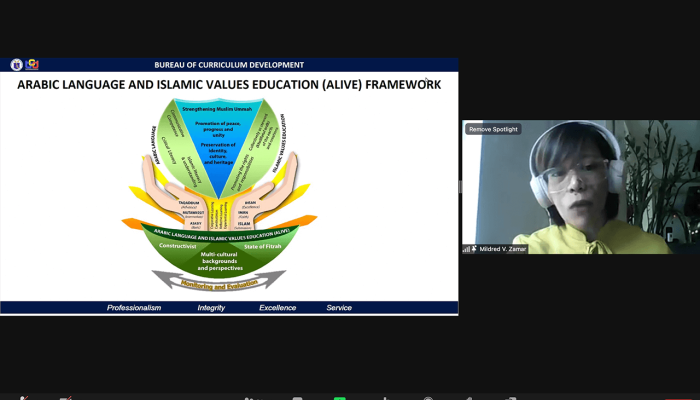 Source/Credit: Islamic Studies ProgramMs. Mildred B. Zamar explains the Arabic Language and Islamic Values Education (ALIVE) framework during her lecture on the DepEd Muslim Education Program.
Source/Credit: Islamic Studies ProgramMs. Mildred B. Zamar explains the Arabic Language and Islamic Values Education (ALIVE) framework during her lecture on the DepEd Muslim Education Program. -
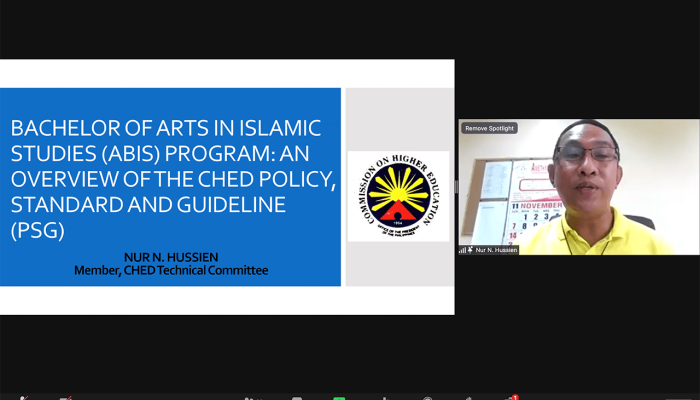 Source/Credit: Islamic Studies ProgramDr. Nur N. Hussein gives a briefer of his lecture on the Commission of Higher Education (CHED) Policies, Standards, and Guidelines on the Islamic Studies program.
Source/Credit: Islamic Studies ProgramDr. Nur N. Hussein gives a briefer of his lecture on the Commission of Higher Education (CHED) Policies, Standards, and Guidelines on the Islamic Studies program. -
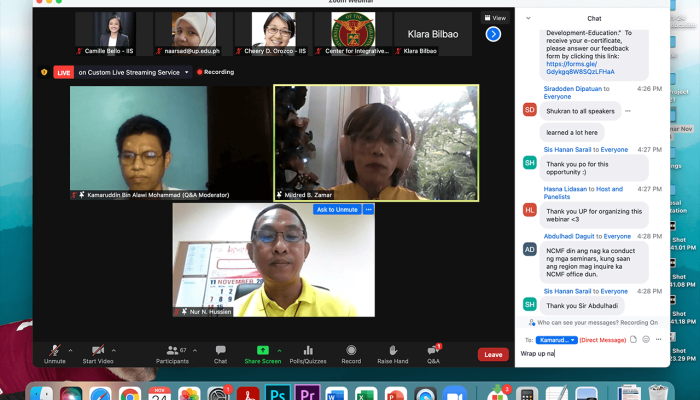 Source/Credit: Islamic Studies ProgramMr. Kamaruddin Mohammad moderates the open forum of the webinar on Muslim Institutional Development on Education.
Source/Credit: Islamic Studies ProgramMr. Kamaruddin Mohammad moderates the open forum of the webinar on Muslim Institutional Development on Education. -
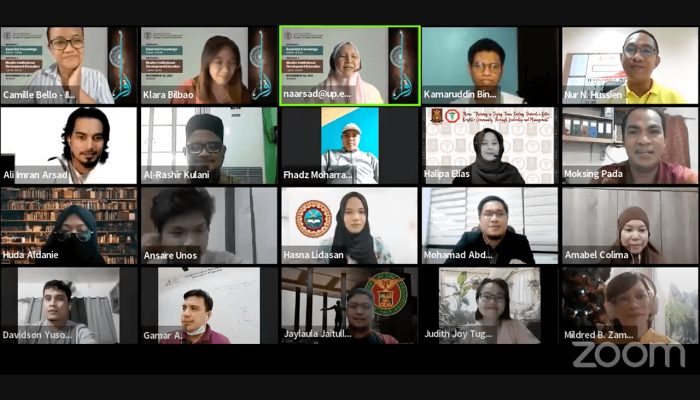 Source/Credit: Islamic Studies ProgramDr. Nefertari A. Arsad invites the attendees for a photo session as the webinar concludes.
Source/Credit: Islamic Studies ProgramDr. Nefertari A. Arsad invites the attendees for a photo session as the webinar concludes.
The Islamic Studies Program (ISP) seeks to advance the critical and strategic roles of Islam in nation-building and determines to lead the Filipino communities to know Islam deeper and consequently deal with the existing stereotypes against Muslims. The three-fold research component is comprised of: (1) Hikma, or the historical and Islamic knowledge for the modern age; (2) Shari’a courts practices, implementations, and issues for revisions; and (3) the Moro story, which entails identifying key issues affecting the dynamics of Moro families locally and globally.
Based on the meeting with UP Institute of Islamic Studies (IIS) Dean Macrina A. Morados, Dr. Nassef Manabilang Adiong, and Dr. Jamel R. Cayamodin, convening a Program on Islamic Studies under the UP CIDS has become imminent.
Although it is possible for Mindanao Studies under the Local–Regional Studies (LRSN) to accommodate scholarly work on Islam because of its proximity to the ARMM, this could not comprise its major research agenda owing to the diversity of Mindanao as well as its multifarious issues.
Confining the population of Muslim Filipinos within the Autonomous Region of Muslim Mindanao (ARMM) or its neighboring regions is also impractical, at best, because Muslim-Filipino communities are found all over the country.
It is about time for the academe to take a more active role in advancing the role of Islam in nation-building. A concrete step is encouraging people to know Islam. This will consequently break down existing stereotypes against Muslims.
Areas of Concentration
“Hikma” is an Arabic word which means “wisdom,” and is inspired by the HIKMA Research of Muslim academics and students based in the University of Sydney.
Research projects and publications may include, but are not limited to: (1) intellectual exchanges between Muslim and Western scholars; (2) Filipino Muslim responses and adaptation to modernity and nation-state system; (3) Filipino communities (e.g. OFWs) in Muslim majority countries; (4) DepEd’s Madrasah Education program (e.g. the ALIVE program which stands for Arabic Language and Islamic Values Education); (5) comparison of Muslim academics trained in Western (secular) and Middle East educational institutions; (6) Nusantara or Southeast Asian Islam; (7) gender equality; (8) women and children’s rights; and (9) Muslim civilizational languages such as Arabic, Farsi, Turkish, Urdu, Bahasa, Sanskrit, Spanish, Moro languages, etc.
PD 1083 component shall serve as the consultative body of counselors rendering legal opinions, in accordance to this Code and Philippine laws, to Filipino Muslims relating to customs, settlement of disputes, personal status, marriage and divorce, paternity, filiations, custody and guardianship, succession and inheritance, and property relations.
An online repository of verified counselors and judicial courts nationwide shall be put in place. Research projects and publications may include, but not limited to: (1) Maqasid al-Shari’ah or higher objectives of Islamic law; (2) comparison between Moro customary laws and PD 1083; (3) Halal Guide; (4) Muslim Jurisprudent-compliant Financial system; and (5) a study of Filipino Muslim converts, commonly known as Balik Islam, and their role and contribution to nation-building.
Bangsamoro is composed of Muslim minority groups that are predominantly located in Southern Philippines (i.e. Mindanao). It has a distinct milieu of history, traditions, mores, knowledge system and socio-political environments guided by their normative and cultural interpretations (mostly imported from the Middle East) of Islam. The Moro peoples are continuously shaped by their Islamic faith, customs, social identities, laws, political affiliations and struggles, interactions with non-Muslims, decades-long negotiations with the national government, operations and implementation of the ARMM, and contemporary international image of Islam mostly represented by Middle Eastern countries. They faced utmost challenges of poverty, lack of educational support, non-existing political leadership and will, among others.
Research projects and publications may include, but not limited to: (1) historical injustice on the Moro peoples; (2) intercommunal cooperation and peaceful coexistence among Lumads, Muslims, and Christians in Mindanao; (3) research on deradicalization of radicalized/extremist Moro sectors, groups and youths; (4) research on compassion, religious pluralism, multiculturalism, and inter/intra-faith dialogues; (5) migrant communities and their politico-social and spiritual dynamics; (6) entrepreneurship and economic development; (7) sense of family cohesiveness; (8) Moro political struggles.
Publications
UP Halal Forum: Harmonizing Roles, Addressing Challenges, and Moving Towards a Common Direction | Proceedings 2 MB 25 downloads
UP Halal Forum_Harmonizing Roles, Addressing Challenges, and Moving Towards a Common...Halal: Filipino Muslim Experience and Trajectory | Discussion Paper 2 MB 72 downloads
Halal_Filipino Muslim Experience and Trajectory ...Narrative-Building for Bangsamoro History | Policy Brief 294 KB 64 downloads
Narrative-Building for Bangsamoro History ...Teaching Methods in Islamic Education | Policy Brief 283 KB 49 downloads
Teaching Methods in Islamic Education ...Why Halal Certification is Important | Policy Brief 593 KB 41 downloads
Why Halal Certification is Important ...Projects and Activities
View the Term Reports from 2018 to 2022 for a list of ISP programs and activities, which include meetings, webinars, and/or publications (forthcoming or already published).
News
The Team
as of May 2025
as of May 2025
Darwin Absari
Convenor
Institute of Islamic Studies
University of the Philippines
Nefertari Arsad, PhD
Project Leader
Institute of Islamic Studies
University of the Philippines Diliman
Nashwina A. Rasul
Senior Research Associate
Camille Lucille Bello
Project Staff
Institute of Islamic Studies
University of the Philippines Diliman
